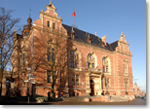Secretariat
Wały Jagiellońskie 1
80-853 Gdańsk Poland
tel. +48 58 301 09 17
tel. +48 58 301 91 23
fax +48 58 301 76 37
 Contact us
Contact us


Speech held at a seminar on Public Transport, Gdańsk, 2-3 March 2000
Juhan Janusson, UBC EU Co-ordinator
Public Transportation in the Baltic Sea Region - Problems and Possibilities
Mr Chairman, Ladies and Gentlemen,
Introduction
Let me start by introducing myself. I am at present involved in UBC mainly in matters dealing with the European Union Enlargement and the impacts on the local government level. However, I have worked with Public Transport most of my active career before UBC - as traffic planner, consultant, and manager at the Swedish State Railways. I have also been involved in Public Transport Projects in the UBC - in fact those made me start working regularly with UBC a few years ago.
Public Transport problems were considered very urgent to solve already from the start of UBC. In the UBC Board Meeting in Tallinn 1993, the eastern cities stated Public Transport as one of their main problems. The reason is of course that buses do not last as long as houses or people. So the one of the main acute problem after the breakdown of the iron curtain was the very quickly deteriorating public transport.
Different Historical Backgrounds
Many problems when creating co-operation projects in the Public Transport Sector come from the different historical background. In Western Europe, Urban Transport is considered a matter for sub-national governments - regions and cities. In east Europe it was a matter for the central ministries in respective country. Now the responsibility has been transferred to the city level, but there are many examples of still prevailing central government influence left. I think that Lithuania is the clearest example of this - the government has laws allowing about fifty various categories to have either reduced fare or free travel in urban buses, all from children and students to blind persons, pensioners, military veterans, police, various professional categories, and so on. The result is that about half of the passengers do not pay any fares, and the city or region has to cover the losses. This is a mix of social and transportation policies which is very unfavourable for the Public Transport sector. You have this situation in other post-socialist countries.
There is a development towards more sub-national control over public transport. In Estonia, very much of the operation of Urban Transport is privatised and all the inter-city or rural buses. Also the passenger train systems is privatised there, including suburban trains. A French company now operates the suburban trains.
Private Small Bus Initiatives
In Lithuania, the weakening if the economic fundament of urban bus companies was leading to worsening situation for the municipal company. In Klaipėda for example, the municipal bus system was further threatened by private initiatives. Very much of the major urban bus system was taken over by small private bus companies that resembles the system you find in for example Istanbul, with the Dolmers, or in Manila with the Jeepneys - and the public is happy because the traffic functions. The city government also supports the development because they get rid of the economic burden of the public buses - instead they get revenue in for of a special tax on the operators and the customers are happy because of high regularity, speed and comfort. In Klaipėda only there are 500 private small bus operators and three private bus companies in addition to the municipal one.
Urban Transport Subsidies?
Urban bus transport was not subsidised in west Europe until late 60'ies, in some cities early 70'ties. I do believe it is important that western expert do not presuppose that subsidies in east is necessary, except of course for major infrastructure investments. If so, the solutions probably will be sub-optimised and not as good as they could be. It is important that the western side in a co-operation project do bot try to copy western solutions into an environment where they do not fit.
Technical or environmental perspectives
The problems of urban transport in the accession countries are mostly shown from the operator perspective, or perhaps the city specialist perspective. The problems thus mainly are considered technical by the eastern cities, to be solved by engineers and money.
In this field you still can find the many problems when creating co-operating projects on public transport. In the east, Public Transport is traditionally regarded as a technical issue, but the perspective in the west is mainly environmental. In the east you shall solve problems with public transport because without it people cannot get to work, and the solution is better buses and more money to buy petrol and pay wages for the staff. In the west Public Transport is mainly for solving environmental problems - energy consumption, emissions into the air, avoiding building motorways that destroy nature and so on. The viewpoints are coming closer, but still there is a substantial difference.
It is significant that that the UBC Participation in this meeting is seen as a part of the Baltic Agenda 21 process and thus the Commission on Environment is the responsible from us and not the Commission on Transportation.
I can take a parallel - there was discussion on creating an UBC Commission on Energy a few years ago. The initiative came from a Lithuanian city. Several cities in Sweden were interested in the idea, they had interested persons in the energy sector in those cities. But the Lithuanian City saw it as an engineering and financing issue - the problems were leaking pipe in the district heating system, lack of money for buying fuel and so on. The Swedish cities were proud of their environmental friendly district heating system, using biological fuels and cleaning the smoke from the chimneys very well. The result was that there was never any UBC Commission on Energy.
Technocratic perspective on Urban Transport
The organisation of urban transport in the east often has been such that the city politicians have very limited influence compared with other areas of city activities. The technocrats rule very much. Every politician gets complaints if the urban transport does not work, but it is very difficult for the politician to influence because the matter is regarded as very technical. If a wastewater manager needs funding for having a better treatment plant, he must argue very much. If the buses stop because of poor conditions, the public immediately tells him that. So the wastewater manager has more incentives to motivate the politicians than the bus company manager does - the public does the work for him.
The result is that public transport often is regarded as an economic black hole that demands more and more resources without the city politician being largely unable to understand what exactly they are supporting. Many mayors I have spoken with find the urban transport sector as very frustrating and difficult to control.
The Swedish Government has initiated a project where they gave away 3-6 years old buses, mainly to Lithuania and Latvia. The cost of the project until now is about 55 million Swedish kronor and more than 100 buses have been shipped over.
I consider the project of having no long-term effects at all and thus rather worthless. When these new buses are worn out in three-five years, the municipal bus companies are in the same situation as before the project - there has not been any change.
I think the conclusion must be that if you want to do some co-operation project, you need to start, or at least include, organisational matters, how to organise and finance public transport. You must work with ownership, the roles of operators at one hand and city urban transport policy on the other hand, fare systems, planning systems, information systems, and so on.
There are two systems of Public Transport organisation in the EU countries in the Baltic Sea Region - the Nordic model and the German model. Significant for the Nordic model is separation of operation and policy, where bus operators take care of the operation and local and regional politicians are responsible for policy. The idea is that the ownership of the bus is of minor importance. Instead the policy is important, and the environment is a part of the policy.
Differences in Cost structure
I also have to mention the difference in cost structure as a major problem in co-operation projects if not properly dealt with. In the east, 20% of the costs are capital and fuel costs, and 80% staff costs. In the eastern countries it is the other way around, 75-80 % are capital costs. An environmental installation on a bus, for example equipment for alternative fuels, can rise the costs for one vehicle by 20-30 %. This is hardly noticeable in a western city where the main cost is staff cost, but for an eastern city the cost may not be possible to take.
The conclusion of this is that solutions on environmental problems must be different in the eastern countries that in the west. In Sweden, the main aim is to diminish the green-house effect caused by public transport. Thus, the solution is to introduce biological fuels on a grand scale on buses. Sweden is now leading in this field in the world.
This method or aim is probably not the most efficient way in the east. It is too expensive and the marginal improvement on the environment is not very noticeable. Instead maybe the main effort should be to increase urban transport patronage and thus diminish the environmental problems caused by private cars. However, in the western countries, increased urban transport patronage leads automatically to increased subsidies. The eastern cities cannot afford that, so the solution must be both to decrease subsidies and increase urban transport patronage at the same time. If you want to archive that, you must implement new ideas and not only implement ideas adapted to western cost structures without analysing the economic results. It is possible to do that, we have examples from for example Klaipėda that probably are successful. We do not know that exactly yet, the situation there must be evaluated, but I do believe we can learn from them.
Conclusion
It is very important to turn away from traditional Western European thinking when finding new solutions on the urban transport problem in the east.
You must not forget organisational matters. Technical solutions you can always find, but if the organisation is not in order, the prospect of success is limited. Organisation includes who is responsible for what, long-tern financing in infra-structure and short term investment in vehicles, financing of operation, fare system, subsidies etcetera.
Also it is important to define the problems. They are not the same in the east as in the west. It is important to agree on what is the problem before you start finding solutions. Different historical backgrounds and different economic level causes different ways of looking at things.
Finally, the different cost structures, with high share of staff cost but low share of capital cost in the west and vice versa in the east leads to totally different solutions.
Thank you!




